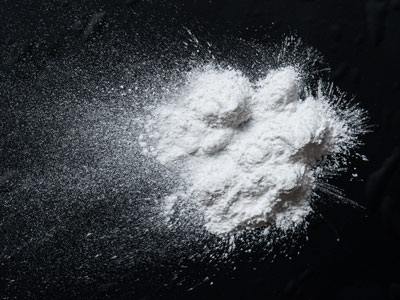Talcum Powder
Talcum powder is a mineral substance with chemical formula Mg3Si4O10(OH)2 . It is also called hydrated magnesium silicate. However, in some cases, small amounts of Ca, Mn, Al, Ti, Si or Fe may replace magnesium (Mg).
- When magnesium is substituted with aluminum, the resulting substance is called Pyrophyllite.
- When magnesium is substituted with large amounts of iron, the resulting substance is called Minnesotaite.

The Sale of Talcum Powder
With wide access to the chain of supply and distribution of talcum powder, Karun Kara Tom Company is capable of providing you with this mineral substance from reliable and valid sources under competitive conditions, suitable prices and high quality. For more information, price inquiry and purchase requests, please contact our sales experts.
Composition and Properties of Talcum Powder
A distinct characteristic of this substance is the very low hardness of its texture (value 1 hardness). As a result, talcum powder is the softest mineral ever discovered.
Uses of Talcum Powder
Talcum powder is used in the following industries:
-
Tiles and Ceramic Industry:
An important usage of talcum powder is its application as a filler material, especially in tile and ceramic industry. This mineral plays a significant role in increasing the resistance of the final product and enhancing its qualities.
-
Cosmetics and Personal Care (hygiene) Industry:
Specific properties of talcum powder increase its functionality in cosmetics and personal care industry. This mineral has a very soft texture and is able to stick to the skin but can be easily washed from it without any damage. Therefore, it is used in manufacturing baby powders, lipsticks, foundations, eyeliners, skin and hair glowing products, nail polish, blushes, etc. In addition, talc can easily absorb the humidity and oil of the skin, so enhances the durability of cosmetic products.
-
Paint and Coatings Industry:
Applying Talcum powder in paint industry increases the adhesiveness of paint and the whiteness and brightness of the product. Due to the softness of talc, it is also used in spray paints. This does not increase the viscosity of paint and therefore the function of spraying is not affected.
-
Glue and Resin Industry:
Talc is used as a filler material for crevices in glue and resin industry.
-
Pharmaceutical Industry:
Pure Talcum powder should be used as filler in manufacturing pills, ointments and other pharmaceutical products. Fine grade talc lacks all sorts of bacteria, iron oxide, carbon, dolomite, and any other impurities.
-
Rubber Industry:
Talc is used in this industry both as filler and insulation to prevent the adhesion of tires to molds.
-
Plastic Industry:
Talcum powder is regularly used as a filler material in the plastic industry. This material increases the rigidity of plastic products (vinyl, Polyethylene, Nylon, Polyester, and Poly Propylene). The result is reduced contractility and enhanced thermal resistance and firmness of these products. Moreover, the softness of talc facilitates the process of detaching the plastic products from molds.
-
Paper Industry:
Apart from being a filler, Talcum powder serves to control the unevenness of the surface of paper and paper covers. The process of manufacturing paper mostly uses paper paste composed of natural and organic fibers such as wood. In the absence of filler materials, thin layers of paper will have a space between their fibers. As a result, it is required to use filler materials to fill the spaces between fibers. Using talc has a number of advantages including improved quality and a smoother surface of paper. It also enhances the quality of printing and writing by increasing ink absorption of paper. Moreover, it reduces the surface tension and eliminates excessive brightness or darkness of the paper.
-
Printing Industry:
As mentioned above, talc is a soft and bright filler with high absorption capacity. Therefore, it is widely used in the manufacturing of high quality paper and ink for printing purposes.
-
Water Treatment Industry:
Talc is used in wastewater treatment plants for purifying water.
-
Food Industry:
Talcum powder is used in food industry as an additive in products such as rice, olive oil, chewing gum, etc.
-
Livestock Industry:
One of the main uses of talc is in livestock industry for controlling the flow of animal food.
-
Rooftop Insulation:
Adding talc to asphalt and insulation materials, significantly increases the resistance of insulation in various climate conditions. Moreover, it reduces the adhesiveness of the insulation surface.
-
Textile Industry:
Talcum powder has various applications within the textile industry. As instance, it is used in starch blends as a filler for temporarily stiffening the texture of fabrics.
-
Sports:
Talcum powder is absorbent and has a very soft texture. Therefore, basketball and weightlifting athletes use it for drying their hands during competitions.
-
Lubricants:
In situations where the use of oil-based lubricants becomes impossible, talcum powder is used as a high temperature lubricant.
-
Agriculture Industry:
Talcum powder is used in agriculture for producing chemical fertilizers, pesticides and insecticides. This type of talc should have the least abrasive quality to avoid corrosion and depreciation in pesticide and insecticide machines.

